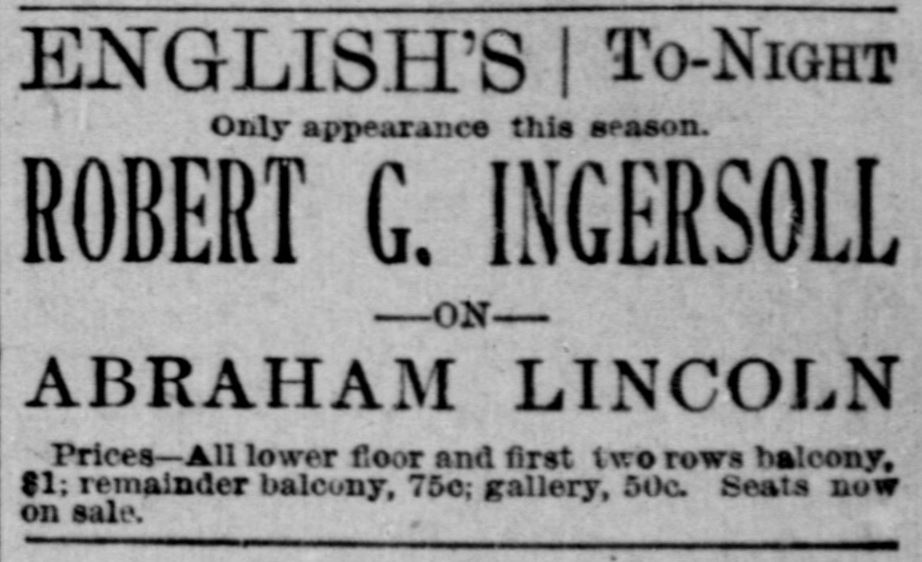
Abraham Lincoln is one of the most written-about subjects in all of human history; thousands of books, articles, and speeches have been published about his life and legacy. As such, there is an interesting interplay between history and memory that manifests whenever the sixteenth President is discussed. Historian David Herbert Donald, one of the foremost Lincoln scholars of the 20th century, wrote in his essay, “The Folklore Lincoln,” that “the Lincoln cult is almost an American religion. It has its high priests in the Lincoln ‘authorities’ and its worshippers in the thousands of ‘fans’ who think, talk, and read Lincoln every day.” What we know about him is interpolated through decades of stories, recollections, and reflections that separate Lincoln “the man” from the Lincoln “the myth.” None of this is necessarily wrong, as all historical figures are subject to mythologizing and memorialization. The task of the historian is to identify the difference between myth and reality, but in a countervailing twist, recognize the historical importance of the development of myths.
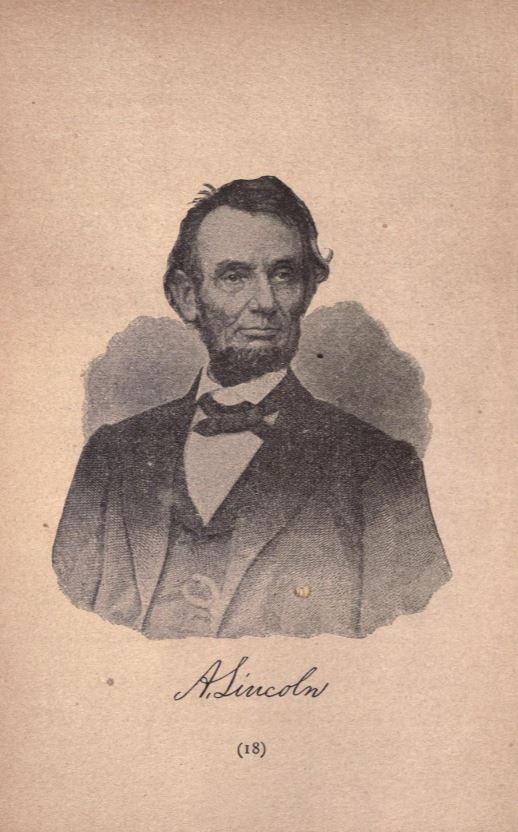
One such figure who mythologized Lincoln while humanizing him was the orator Robert Green Ingersoll. Among the most sought-after public speakers and intellectuals of the late nineteenth century, Ingersoll is best remembered today for his excoriating lectures on religion. Known as the “Great Agnostic,” Ingersoll became the outstanding leader of the “Golden Age of Freethought,” the era between the Civil War and World War I which saw a groundswell of religious criticism and secular activism. But his lectures, which were attended by thousands over the decades, were not limited merely to religion. In fact, he spoke on a variety of subjects, from William Shakespeare to the history of the United States. As a veteran of the Civil War, Ingersoll’s life deeply intertwined with arguably the most important event in the history of nineteenth century America.
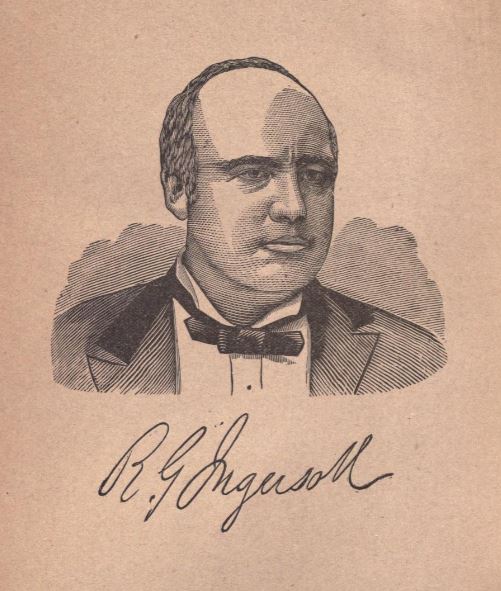
His memorialization of Lincoln and the Civil War era started in earnest within a matter of years after the war ended. In September of 1876, Ingersoll delivered one of his most influential speeches in Indianapolis, referred to as the “Vision of War” speech. Introduced as “that dashing cavalry officer, that thunderbolt of war, that silver tongued orator” by Brevet Brigadier General Edward F. Noyes, Ingersoll commemorated the sacrifices of Union veterans, as well as stumped for Republican presidential candidate Rutherford B. Hayes in his remarks. Throughout his speech, Ingersoll used the memory of Lincoln to hit home his partisan political message. One such example: “Every man that cursed Abraham Lincoln because he issued the Proclamation of Emancipation—the grandest paper since the Declaration of Independence—every one of them was a Democrat.” Clearly the Emancipation Proclamation of 1863 was a contentious document in its time, of which many politicos disagreed with. Nevertheless, Ingersoll’s rhetorical flourish used Lincoln’s political prescience to elevate the Republican party, which Ingersoll saw as the party of freedom and progress.
In the middle of his speech, Ingersoll’s tone shifted from partisan (and somewhat rancorous) to poetic and solemn as he reflected on the horrors of war, its fallen soldiers, and the society those who fought had left behind. “These heroes are dead,” he began:
They died for liberty — they died for us. They are at rest. They sleep in the land they made free, under the flag they rendered stainless, under the solemn pines, the sad hemlocks, the tearful willows, and the embracing vines. They sleep beneath the shadows of the clouds, careless alike of sunshine or of storm, each in the windowless Palace of Rest. The Earth may run red with other wars — they are at peace. In the midst of battle, in the roar of conflict, they found the serenity of death! I have one sentiment for all soldiers living and dead: cheers for the living; tears for the dead.
As a man who fought at the Battle of Shiloh, who experienced horrors as a prisoner of war, Ingersoll’s words were not mere flights of rhetoric. He intimately understood the sacrifices his generation made in the service of saving the Union, and he wanted every person hearing his words that day to recognize those sacrifices.
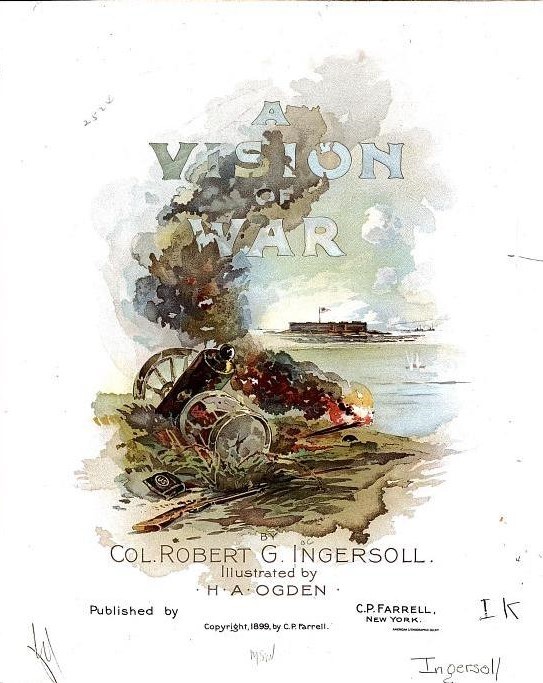
His remarks received an immediate public reaction. The Indianapolis News praised his speech, albeit with slight criticism, writing “the orator justified all expectations by delivering a speech, bitter in perhaps of arraingment [sic], but comprehensive, eloquent, and inimitable.” The ‘vision of war’ section was later reprinted as a pamphlet with illustrations that reiterated many of its core themes. It was one of the orations that made Ingersoll a nationally-renowned public speaker.
By 1880, then a more accomplished orator, Ingersoll began to tackle Lincoln as a subject more directly, publishing a laudatory sketch of the president that was published in pamphlet form. This version focused less on biographical details and more on character impressions of the president. Right from the outset, Ingersoll was keenly aware of how Lincoln’s memory is shaped by the public, often to the negation of the real person. As he wrote, “Hundreds of people are now engaged in smoothing out the lines of Lincoln’s face—forcing all features to the common mold—so that he may be known, not as he really was, but, according to their poor standard, as he should have been.” The metaphor of “smoothing out” is certainly apt; upon his assassination in 1865, Lincoln’s visage appeared in countless artistic depictions which removed him from the realm of mortals and into the hands of providence. He became more of a symbol than a man.
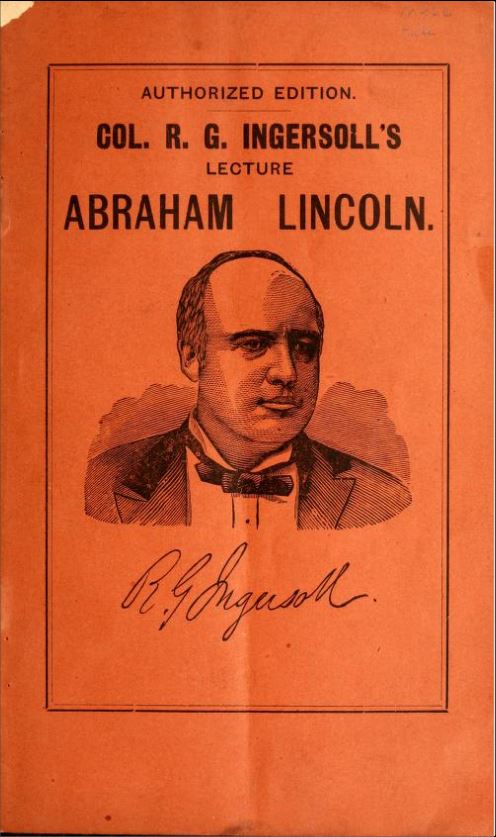
Ingersoll sought to counter this with his 1880 pamphlet, reminding Americans that “Lincoln was a many-sided man, acquainted with smiles and tears, complex in brain, single in heart, direct as light; and his word, candid as mirrors, gave the perfect image of his thought. He was never afraid to ask—never too dignified to admit that he did not know.” Ingersoll’s portrait, while still quite laudatory, nevertheless centered Lincoln’s humility and complexity, reaffirming his humanity rather than attempting to deify him. Additionally, Ingersoll emphasized Lincoln’s dedication to education, despite the latter’s known history of scant instruction. “Lincoln never finished his education,” he noted, “To the night of his death he was a pupil, a learner, an enquirer, a seeker after knowledge.” This was in stark contrast to those who Ingersoll called “spoiled by what is called education. For the most part, colleges are places where pebbles are polished and diamonds are dimmed.” This revealed an influential parallel between Ingersoll and Lincoln. Both were Illinoisans who received little formal education and became lawyers through independent study, rather than going to a university. Ingersoll saw much of himself in Lincoln, which one suspects impacted the orator’s portrait of the president as a self-educated, self-made man unsullied by the indulgences of the established ways of acculturation. In all, Ingersoll’s 1880 pamphlet depicted Lincoln as a moral, and even righteous, figure, but still relatable— a man dedicated to education, honesty, and self-improvement.
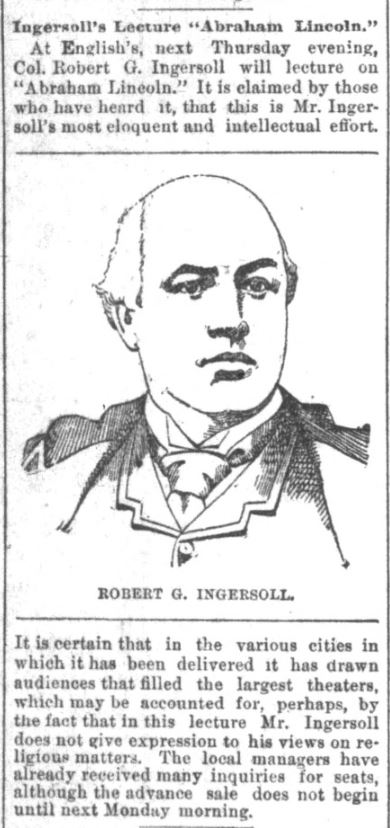
By the 1890s, Ingersoll’s renown for oratory made him constantly in demand, and for the 1893 Lincoln Dinner of the Republican Club of New York on February 11, he delivered a revised version of his speech as a keynote speaker. While much of the text is similar to the 1880 version, Ingersoll added a section of Lincoln’s own oratory as a means of memorialization. The passage, which Ingersoll described lovingly as “sculptured speech,” was taken from Lincoln’s remarks in Edwardsville, Illinois on September 11, 1858, during his run for the Senate against Stephen A. Douglas:
And when, by all these means, you have succeeded in dehumanizing the negro; when you have put him down and made it impossible for him to be but as the beasts of the field; when you have extinguished his soul in this world and placed him where the ray of hope is blown out as in the darkness of the damned, are you quite sure that the demon you have roused will not turn and rend you? What constitutes the bulwark of our own liberty and independence? It is not our frowning battlements, our bristling seacoast, our army and our navy.
These are not our reliance against tyranny. All of those may be turned against us without making us weaker for the struggle.
Our reliance is in the love of liberty which God has planted in us. Our defence [sic] is in the spirit which prizes liberty as the heritage of all men, in all lands everywhere.
Destroy this spirit and you have planted the seeds of despotism at your own doors. Familiarize yourselves with the chains of bondage and you prepare your own limbs to wear them.
Lincoln’s words placed liberty, not mere power, at the heart of the American experiment of self-government, a heart which would be torn asunder by the barbarism of slavery. In reflecting on Lincoln’s use of language, Ingersoll declared, “The orator loves the real, the simple, the natural, and he places thought and feeling above all. He knows that the greatest ideas should be expressed in the shortest words. He knows that a great idea is like a great statue, and he knows that the greater the statue the less drapery it needs.” Among other attributes, Lincoln’s use of simple, but poetic language during a time of deep of crisis, in Ingersoll’s estimation, cemented his place in American history.
Robert Ingersoll delivered his speech on Lincoln during a nationwide tour in 1893, with one of the stops being Indianapolis. He had spoken many times in Indianapolis since his “vision of war” speech in 1876, but the venue in 1893 was the illustrious English Opera House, which was located on Monument Circle and was a mainstay of the entertainment industry during the era. The Indianapolis News and Journal ran flashy advertisements in advance of his appearance, with the latter stating “Colonel Ingersoll’s treatment of the subject is said to be one of those rarely intellectual things that is to be heard but a few times in a lifetime.” Ingersoll arrived in Indianapolis at noon on May 4, 1893, mere hours from his scheduled performance, according to the News. The Journal ran a final advertisement in its early edition, noting that it would be Ingersoll’s “only appearance this season.”
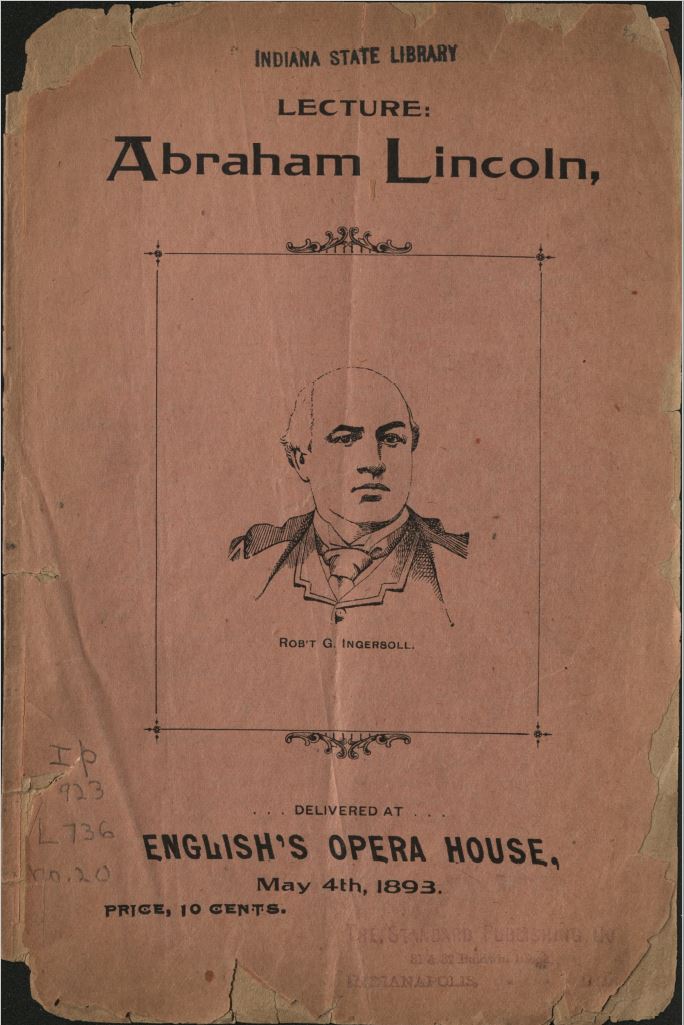
The Standard Publishing Company of Indianapolis reproduced his speech, with commentary, in pamphlet form (a digital version is available via Indiana Memory). Ingersoll opens his speech with a fascinating coincidence of history: Abraham Lincoln and Charles Darwin were born on the same day, February 12, 1809. “Eighty-four years ago two babes were born,” he began:
one in the woods of Kentucky amid the hardships and poverty of pioneers; one in England surrounded by wealth and culture. One was educated in the university of nature, the other at Oxford. One associated his name with the enfranchisement of labor, with the emancipation of millions, with the salvation of the Republic. He is known to us as Abraham Lincoln. The other broke the chains of superstition and filled the world with intellectual light, and he is known as Charles Darwin. Because of those two men the nineteenth century is illustrious.
Ingersoll viewed Darwin and Lincoln as emancipatory figures, with Lincoln the emancipator of people and Darwin the emancipator of minds. As one of the first to popularize the theory of evolution in America, Ingersoll comprehended the profound implications of Darwin’s ideas in a deeply religious country. Perhaps Ingersoll linked Darwin with Lincoln in an attempt to soften the intellectual blow of his concepts; conversely, linking Lincoln with Darwin emphasized the importance of the former’s contributions to humanity, ones with transformative consequences for his nation.
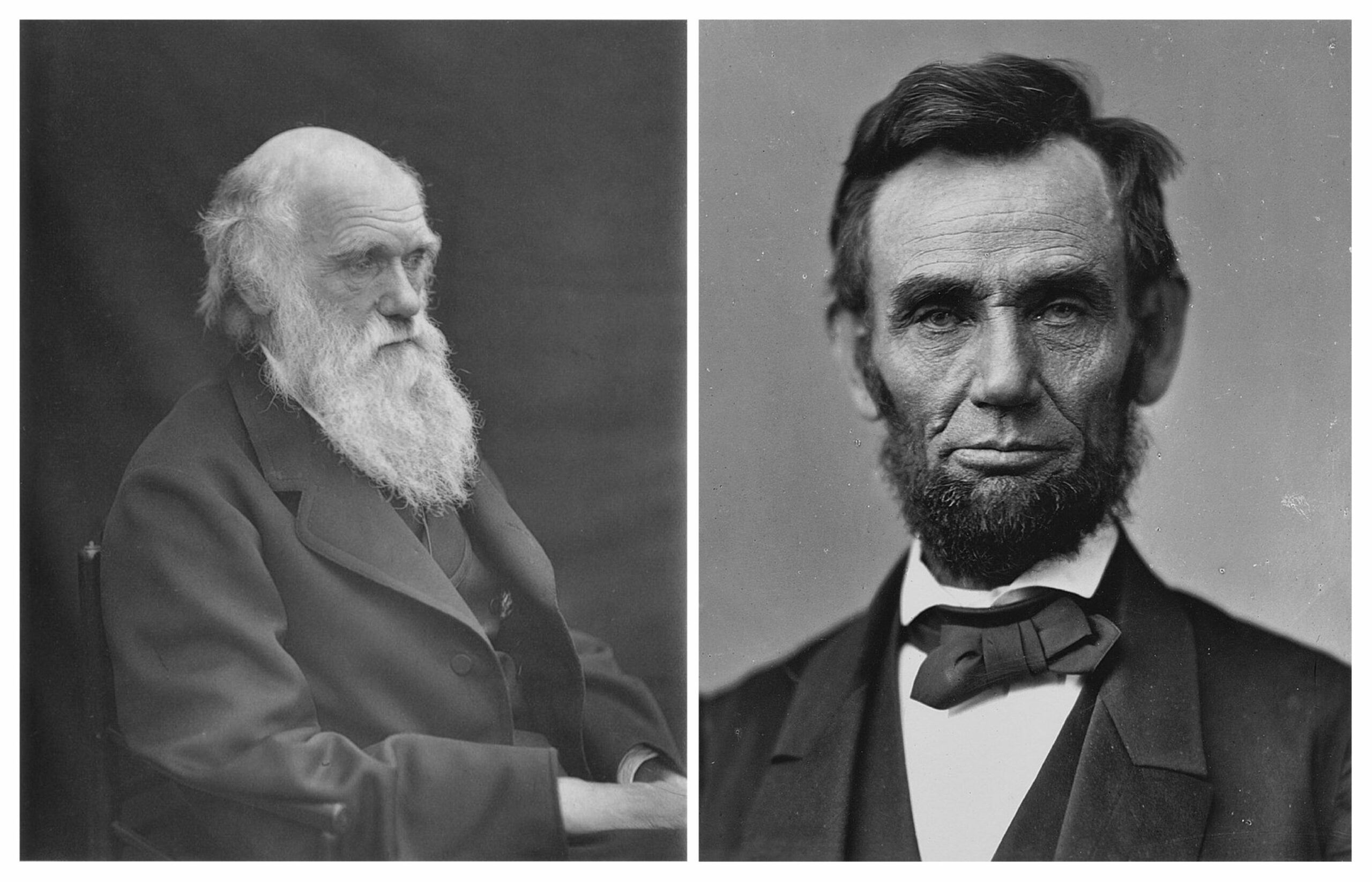
Later in his lecture, Ingersoll painted a portrait of Lincoln as a man of contradictions who nevertheless transcended them. “The sympathies of Lincoln, his ties, his kindred, were with the South,” he noted, “His convictions, his sense of justice and his ideals were with the North.” Born of upland southern ancestry and marrying into a southern aristocratic family, Lincoln could have easily given into the currents of his experiences. Yet, “he knew the horrors of slavery, and he felt the unspeakable ecstasies and glories of freedom,” Ingersoll continued, and “he had the manhood and independence of true greatness, and he could not have been a slave.” Lincoln’s abhorrence of slavery, and the political road that conviction took him on, made him, in Ingersoll’s eyes, a statesman rather than mere politician. “A politician schemes and works in every way to make the people do something for him,” the orator declared, while “A statesman wishes to do something for the people. With him place and power are the means to an end, and the end is the good of his country.” For Ingersoll, Lincoln’s sense of higher purpose allowed him to transcend his age and become a leader for the ages.
Near the end of his speech, Ingersoll directly addressed the question of memory in regards to the “Great Emancipator.” “The memory of Lincoln,” he said, “is the strongest, tenderest tie that binds all hearts together now, and holds all States beneath a nation’s flag.” With this passage, Ingersoll positioned Lincoln as the force which connected the Union and transformed the United States from a loose conglomeration of states into a single, unified nation. The nationalism of late-nineteenth century America was on full-display, with Lincoln as the catalyzing agent melding heart and hearthstone across the land. (This is an image of Lincoln that persists to this day; in times of crisis, politicians and the media often look to Lincoln for insights on how to unify and connect the people of America.) To reaffirm the importance of memory, Ingersoll ended his speech with the moving words, “Lincoln was the grandest figure of the fiercest civil war. He was the gentlest memory of our world.”
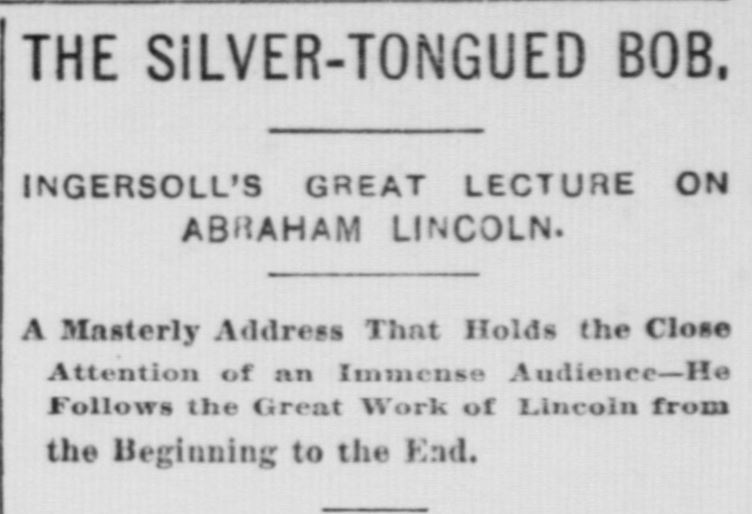
Ingersoll’s appearance was a resounding success, with the Indiana State Sentinel writing, “English’s opera house was packed from gallery to pit Thursday to hear America’s greatest orator in his famous lecture, ‘Abraham Lincoln’.” Of his performance, the Sentinel also said, “Col. Ingersoll has lost none of his great ‘personal magnetism’ that enables him to move his audience to the feeling of his every emotion.” Its publication in pamphlet form ensured more people would consume his lecture, thus furthering Ingersoll’s memorializing of the sixteenth President.
Despite his success with audiences and readers, Ingersoll caught the ire of critics concerning his treatment of Abraham Lincoln’s religious views. Ingersoll, a religious skeptic who gave public speeches denouncing Christianity, was accused of asserting that Lincoln was a nonbeliever. As a March 26, 1893 editorial in the Indianapolis Journal remarked, “The assertion of Colonel Ingersoll in his address on the character of Abraham Lincoln, to the effect that he was a freethinker after the manner of Voltaire and Paine, challenged emphatic contradiction which was no more conclusive than the Ingersoll declaration.” The article then provides numerous quotations which give credence to the claim that Lincoln was a believer in God, such as the speech he gave in 1861 in Springfield before he left for Washington, wherein he said:
A duty devolves upon me which is, perhaps, greater than that which has devolved upon any other man since the days of Washington. He never would have succeeded except for the aid of Divine Providence, upon which he at all times relied. I feel that I cannot succeed without the same Divine aid which sustained him, and on the same Almighty Being I place my reliance for support, and I hope you, my friends, will all pray that I may receive that Divine assistance without which I cannot succeed, but with which success is certain.
At the same time, Lincoln may have not accepted the mainstream consensus on Christianity, which the editorial granted. “Abraham Lincoln may not have troubled himself about dogmas,” the Journal acknowledged, “but no man was ever more devout in his reliance upon the great power which controls human acts and events, or whose conduct was more thoroughly in harmony with the truths of the Sermon on the Mount.”
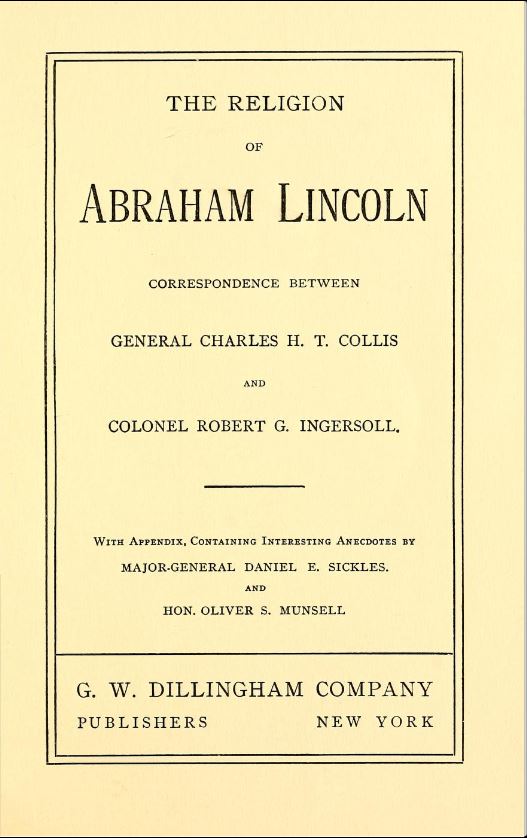
Ingersoll addressed these concerns head on in a series of letters between himself and Colonel Charles H. T. Collis, an Irish immigrant to the United States who also served in the Civil War. A book compiling their correspondence was published in 1900, shortly after Ingersoll’s death. Collis attended Ingersoll’s performance of the Lincoln speech in New York on February 11, 1893 and immediately wrote to him challenging his conclusions on Lincoln’s faith. With passion and conviction, Collis wrote, “no man invoked ‘the gracious favor of Almighty God’ in every effort of his life with more apparent fervor than did he, and this God was not the Deists’ God, but the God whom he worshiped under the forms of the Christian Church, of which he was a member.” Ingersoll retorted in a follow up letter, writing, “Lincoln was never a member of any church,” and that “he denied the inspiration of the Scriptures, and that he always insisted that Christ was not the Son of God, and that the dogma of the Atonement was, and is, an absurdity.”
As with much of history, Lincoln’s religious beliefs fall somewhere between Ingersoll’s and Collis’s. It is true that he never formally joined a church or was baptized, but he often asked for counsel from religious leaders and infused his speeches, especially the Second Inaugural, with meditations that bordered on theology. As historian and Lincoln biographer David R. Contosta has written, “he was no Christian in any conventional sense of the term, since there is no evidence that he ever accepted the divinity of Christ or ever joined a church,” but “what he had come to embrace in the end was the inscrutable omnipotence of a God who worked his will in history though persons and events of his own time and choosing.”
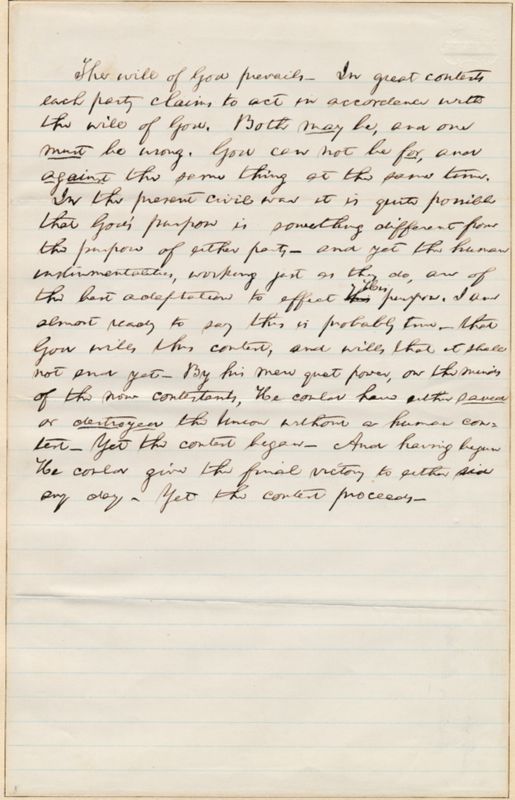
One striking piece of evidence to support Contosta’s conclusion is Lincoln’s “Meditation on the Divine Will,” written in September of 1862. “The will of God prevails,” Lincoln reflected:
In great contests each party claims to act in accordance with the will of God. Both may be, and one must be, wrong. God cannot be for and against the same thing at the same time. In the present civil war it is quite possible that God’s purpose is something different from the purpose of either party – and yet the human instrumentalities, working just as they do, are of the best adaptation to effect His purpose. I am almost ready to say that this is probably true – that God wills this contest, and wills that it shall not end yet. By his mere great power, on the minds of the now contestants, He could have either saved or destroyed the Union without a human contest. Yet the contest began. And, having begun He could give the final victory to either side any day. Yet the contest proceeds.
Lincoln’s theology centered the agency of God in human affairs, using people as agents of his divine plan. These musings emphasize Lincoln’s belief in fate, a holdover from his Primitive Baptist upbringing, which, Contosta noted, stressed “predestination and human sinfulness.” Lincoln was not an Agnostic like Ingersoll, but he also wasn’t the kind of Christian the Collis portrayed him as. As with many aspects of his life, Lincoln was a complex, often contradictory figure whose idiosyncratic religious views highlighted these tensions.
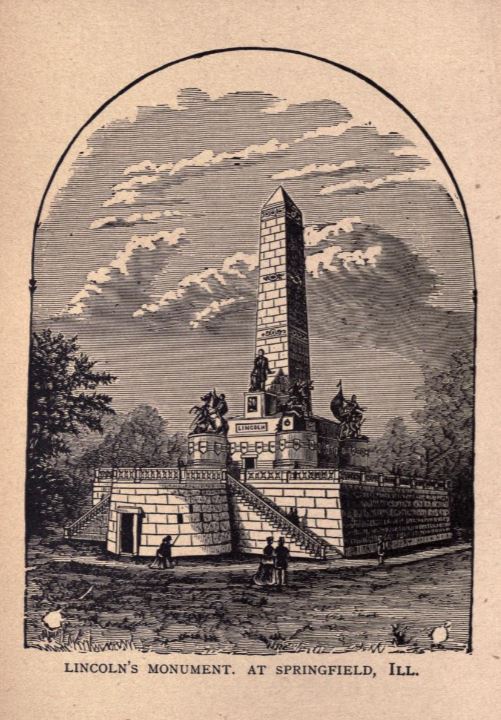
The Civil War, with Lincoln as its central protagonist, was the defining event of Ingersoll’s life. It shaped his view of politics, oratory, and even religion. He placed a high priority on telling this story with eloquence, mastery, and tactfulness. As a result, it is not surprising that his lectures on Lincoln became so popular, as well as lauded. In commenting on his speech in Indianapolis, a pamphlet noted, “No man in the world could do justice to the memory of Abraham Lincoln with the same force and eloquence as Colonel Robert G. Ingersoll.” While many books and recollections were published during Ingersoll’s time, he kept the public memory of Lincoln alive as only an orator could do. In some respects, it was a logical outgrowth of Lincoln himself, who was one of the most influential public speakers in American history. Robert Ingersoll’s orations on Lincoln, while somewhat forgotten now, nevertheless provided a unique contribution to the memorialization and mythologization of the sixteenth President—a vast tapestry of remembrance which exists to this day.
